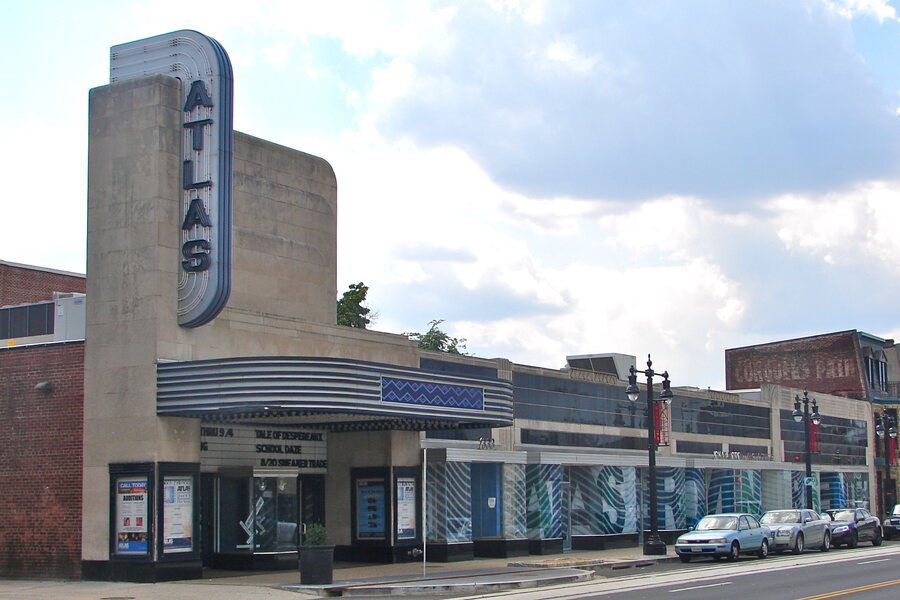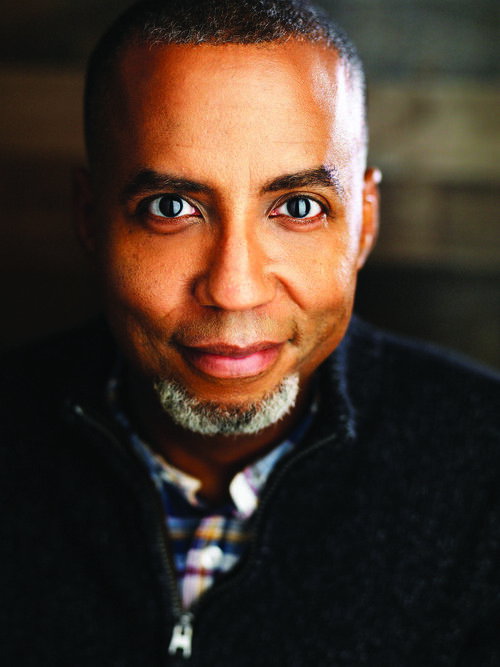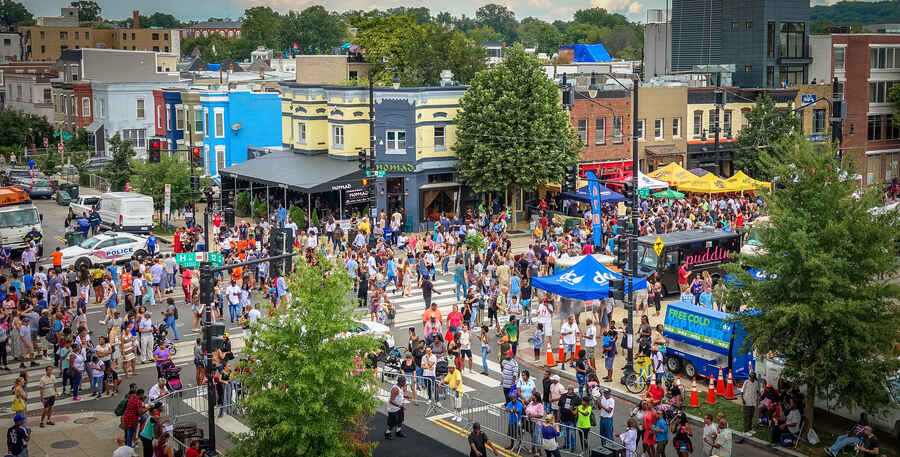If you have cause to visit Atlas Performing Arts Center in Washington, D.C., I recommend taking the long walk down H Street from Union Station. The first hundred yards are less than scenic, but once you cross the bridge, you will find yourself in the H Street Corridor, a historic commercial district diverse in population and cuisine, colored by the city’s superb street art, adjacent to historic institutions and picturesque rowhouses, and touched by the ongoing effects of gentrification.
This little slice of D.C. is the subject of the multi-year H Street Oral History Project, which culminates March 16-17 with a festival centered on readings of three new plays. The plays, inspired by interviews with area residents, are written by Dane Figueroa Edidi, Gethsemane Herron-Coward, and James J. Johnson. The readings will be accompanied by discussions curated by the D.C. History Center, tours led by Justice Walks, and food samples from H Street hotspots (I’m crossing my fingers for Dangerously Delicious Pies). It all takes place at Atlas under the purview of Mosaic Theater Company and is supported by a grant from the National Endowment for the Arts, the Eugene M. Lang Foundation, and a host of local funders.
The project is the brainchild of D.C.-based writer, director, and actor Psalmeyene 24. Psalm, as he’s known, pitched the project in 2019 as part of his application to be Mosaic’s Andrew W. Mellon playwright-in-residence, reckoning it would match the company’s ethos.
“Knowing that Mosaic had a real investment in theatre that resonated with the community was part of [the appeal],” Psalm recalled. “And then thinking about my vision as a storyteller and being invested in illuminating stories that are rooted in the Black experience in some way—this project seemed like the perfect fit.”
Mosaic meticulously laid the foundation for Psalm’s vision under the leadership of artistic director Reginald L. Douglas. Throughout 2021 and 2022, the company and project dramaturg Jordan Ealey fostered connections with local history and social justice organizations and identified interview candidates through both personal affiliations and community outreach. Then they matched each playwright with a diverse handful of residents: artists and community leaders, D.C. natives and transplants, Black and white people. Interviews took place on Zoom in 2023, with Ealey helping to prep the playwrights.
Each interview was recorded, and will be added to the archives of the D.C. Public Library under the auspices of the D.C. Oral History Collaborative—effectively making history in more ways than one. “That’s one of the core parts of the project that excites me and inspires me,” said Douglas. “I believe in new plays because I want to help create a new canon of theatre that centers stories like the H Street Oral History Project has collected. But I am also so excited about having the voices of this community, the D.C. residents who don’t often get talked about or who could be forgotten, living in the D.C. public record by being in the library.”
From the beginning, Psalm has sought to anchor the gathering process by centering a pivotal event in the neighborhood’s history: the civil unrest following the assassination of Dr. Martin Luther King Jr. in 1968. At the time, H Street was one of several prominent centers of Black commerce, all of which were hit hard by looting and violence that overshadowed attempts at political mobilization by local activists.
The events left the area blighted for decades. Jane Lang, the successful litigator who founded Atlas Performing Arts Center and contributed to the project with time and funding, first visited H Street in 2000 and found it riddled with crime and empty lots. A white woman of some means, Lang was very much an outsider, but she eventually won backing for her vision to transform an old movie theatre into a multi-purpose performing arts venue. “It was not necessarily enthusiasm for the project itself but recognition that there was nothing better that was going to come along any time soon and [the community] was desperate to see the neighborhood revived,” Lang admitted matter-of-factly.

During its development, Lang pitched the Atlas as the “future People’s Kennedy Center.” Since opening in its new form in 2006, it has indeed become an active (and relatively affordable) arts hub, hosting solo performers, companies, and festivals that might not have the means to present their work elsewhere. As for H Street itself, Lang contends that the broader push for development has been an inarguable success. She cites seeing only one sit-down restaurant in the corridor in 2000; now there are dozens sitting alongside new grocery stores, businesses, and multi-family housing units.
When asked about the fine line between revitalization and gentrification, Lang is quick to point out that urban development moves in cycles. One could argue that history moves much the same way: Right before Psalm officially joined Mosaic in July 2020, Dr. King’s assassination got what Psalm himself described as a fitting but tragic companion, i.e., the murder of George Floyd and subsequent outcry. For Psalm, using the events as bookends was the ideal opportunity to explore what has gotten better for Black people since King’s death in 1968—a Black president, for example—and what seems to have not (levels of unemployment and incarceration).

From this common framework comes a diverse trio of plays. Though drawn from the well of community contributors, each bears the mark of its writer’s disposition, not to mention their own lives on H Street. Gethsemane Herron-Coward’s George On H, for example, is the story of a young man, caught in a state between life and death, who returns to his neighborhood and finds it changed. It’s inspired by the people who lost their lives in the riots, but also by the ways that Herron-Coward, a native of the D.C.-Maryland-Virginia (DMV) area, has been processing those very same changes in a place she knows very well.
“I spent so much time on H Street going to Taste of Jamaica for lunch, walking up and down, seeing so many of my friends and family members who had homes” in the neighborhood, she recalled. Sadly, many of the independent vendors she remembers—Murray’s Grocery Store, where she would enjoy a soda, for example—have been replaced by corporate chains. “To be able to participate in this project is to not only get to learn more about history, but also to have an outlet for the grief that I feel about that.”

For Dane Figueroa Edidi, a Baltimore native who has lived in D.C. off and on since 2002, much of the work comes back to belonging. “What I did learn from the interviews was the ways in which some community members really, really showed up for the community,” she said. She described one interviewee who opened her home up to another family during the 1968 riots and ended up hosting them for several more years. A sense of home pervades her play, Smoke, about a Black trans woman who moves into her grandmother’s house on H Street after she dies and forms a bond with her new neighbors.
Centering a woman like herself while exploring this history also engages Figueroa with the political concerns of the 1960s, many of which—the necessity of collective uplift, resisting trans erasure—remain in contention today. “We talk about the Civil Rights Movement within the mainstream, but there was also the Compton’s Cafeteria Riot, right?” she says of the 1966 response to police harassment of queer citizens in San Francisco, a precursor of the more famous Stonewall Riot in New York City. “There was so much cross-movement work, specifically by Black LGBTQ people telling the world to see them as their full selves.”

Though not divorced from political realities past and present, James J. Johnson’s play Central Time, a “big adventure sci-fi comedy” about a woman transported back in time to the day before Dr. King’s assassination, has a different tone than that of its counterparts. Finding humor in unexpected places is something Johnson credits to his father, a preacher who apparently missed his calling as a comedian. “The humor is not coming from the trauma,” he pointed out, “but in how we relate to each other when stress is high or when the stakes are high.”
Of the three, Johnson is the newest to playwriting and in fact still identifies primarily as an actor. But like his colleagues, he is hardly new to the area and its history. In 2006, he served as a production assistant for a DVD exploring Black history and culture on H Street, produced by hotghettomess.com. While the website was criticized in some circles for “not necessarily showing the best of the African American experience,” the opportunity exposed Johnson to prescient critiques of gentrification and to history that revealed itself through interviews with locals.
Johnson would return to the area several times over in numerous roles at Atlas. Indeed, Atlas is something of a home to many of the project’s creators: Psalm recalls innocently trespassing on the unfinished grounds with a troupe of fellow dancers while the building was being renovated in the early 2000s. Figueroa credits a production of Erik Ehn’s play Shape, staged there by the multidisciplinary company Force/collision, as giving proof that she had what it took to be a leading lady. Interviewees who contributed to the project will have their own opportunity to make memories by participating in conversations following the readings if they so choose.
Ultimately, the festival is about spotlighting those who donated their stories and celebrating the community at large. Douglas said he is looking forward to seeing artists and interviewees share this experience, and alluded to plans for continuing the work with support from Lang. And while there is always hope the plays will have a full life after the readings, for Psalm, the project is about keeping to that communal ethos.
“I think it’s more about how we relate to our audience,” he says, “and making sure that we’re not only creating theatre in a certain place, but we’re working with the people who live there in a way that feels integral to the art-making.”
Assuming they succeed, the festival will stand as a fitting tribute to a neighborhood that has itself been integral to the lives of these and many other artists.
Jared Strange (he/him) is the director of education and community programs at The National Theatre Foundation, as well as a writer, dramaturg, scholar, and educator based in the Washington, D.C. area.


